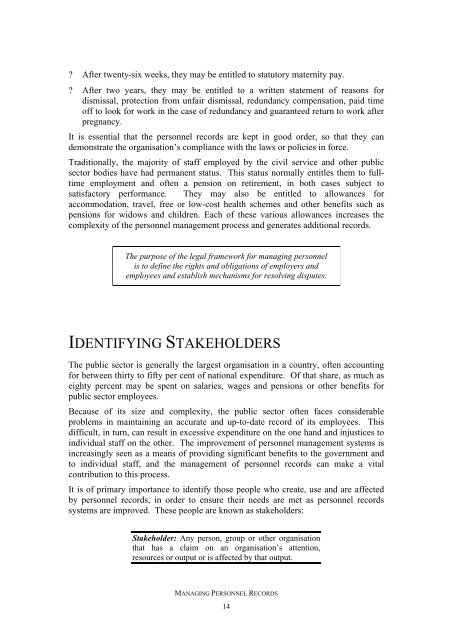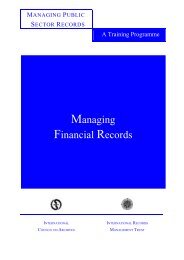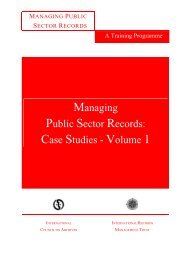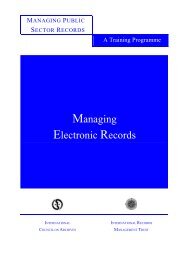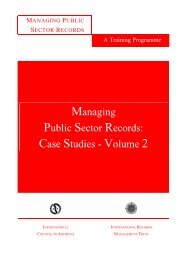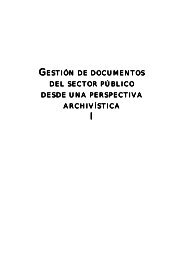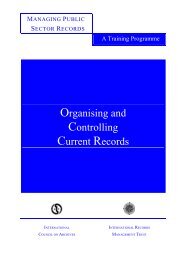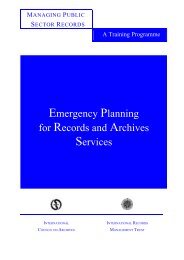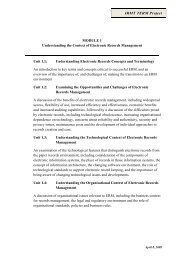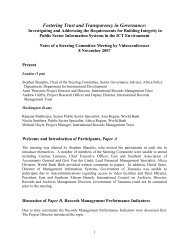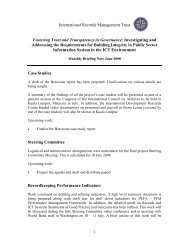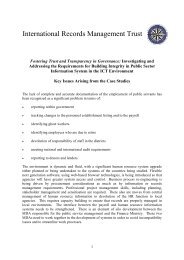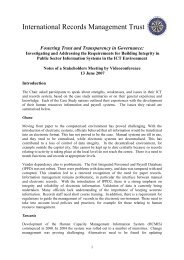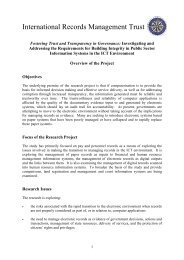Managing Personnel Records - International Records Management ...
Managing Personnel Records - International Records Management ...
Managing Personnel Records - International Records Management ...
You also want an ePaper? Increase the reach of your titles
YUMPU automatically turns print PDFs into web optimized ePapers that Google loves.
? After twenty-six weeks, they may be entitled to statutory maternity pay.<br />
? After two years, they may be entitled to a written statement of reasons for<br />
dismissal, protection from unfair dismissal, redundancy compensation, paid time<br />
off to look for work in the case of redundancy and guaranteed return to work after<br />
pregnancy.<br />
It is essential that the personnel records are kept in good order, so that they can<br />
demonstrate the organisation’s compliance with the laws or policies in force.<br />
Traditionally, the majority of staff employed by the civil service and other public<br />
sector bodies have had permanent status. This status normally entitles them to fulltime<br />
employment and often a pension on retirement, in both cases subject to<br />
satisfactory performance. They may also be entitled to allowances for<br />
accommodation, travel, free or low-cost health schemes and other benefits such as<br />
pensions for widows and children. Each of these various allowances increases the<br />
complexity of the personnel management process and generates additional records.<br />
The purpose of the legal framework for managing personnel<br />
is to define the rights and obligations of employers and<br />
employees and establish mechanisms for resolving disputes.<br />
IDENTIFYING STAKEHOLDERS<br />
The public sector is generally the largest organisation in a country, often accounting<br />
for between thirty to fifty per cent of national expenditure. Of that share, as much as<br />
eighty percent may be spent on salaries, wages and pensions or other benefits for<br />
public sector employees.<br />
Because of its size and complexity, the public sector often faces considerable<br />
problems in maintaining an accurate and up-to-date record of its employees. This<br />
difficult, in turn, can result in excessive expenditure on the one hand and injustices to<br />
individual staff on the other. The improvement of personnel management systems is<br />
increasingly seen as a means of providing significant benefits to the government and<br />
to individual staff, and the management of personnel records can make a vital<br />
contribution to this process.<br />
It is of primary importance to identify those people who create, use and are affected<br />
by personnel records, in order to ensure their needs are met as personnel records<br />
systems are improved. These people are known as stakeholders:<br />
Stakeholder: Any person, group or other organisation<br />
that has a claim on an organisation’s attention,<br />
resources or output or is affected by that output.<br />
MANAGING PERSONNEL RECORDS<br />
14


